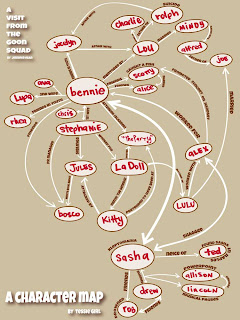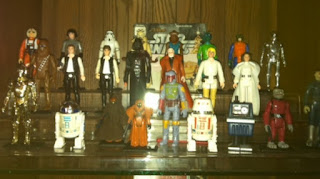The Bastard Genre
Turns out modern sci-fi owes nearly everything to a bastard.
 The surprise here isn't that most of the most famous tropes in science fiction owe themselves to a single work - hello, Star Wars - but that they originated from a book that was essentially fan fiction. Garret P. Serviss somehow avoided the legal apocalypse that would surely visit him today after publishing an unauthorized sequel to H.G. Wells's The War of the Worlds - Edison's Conquest of Mars. The book was apparently written on commission from The Boston Post - I guess things were looser back then - and featured Thomas Edison leading the fight back to Mars.
The surprise here isn't that most of the most famous tropes in science fiction owe themselves to a single work - hello, Star Wars - but that they originated from a book that was essentially fan fiction. Garret P. Serviss somehow avoided the legal apocalypse that would surely visit him today after publishing an unauthorized sequel to H.G. Wells's The War of the Worlds - Edison's Conquest of Mars. The book was apparently written on commission from The Boston Post - I guess things were looser back then - and featured Thomas Edison leading the fight back to Mars.
The article at Cracked labels Serviss a 'hack.' I won't make accusations as to the man's ability (capsule review: Serviss never met a comma he didn't like. Also, brownie points for 'puissance') but I don't think it's fair to dismiss him so easily.
According to Wikipedia, 'the book contains some notable "firsts" in science fiction: alien abductions, spacesuits (called "air-tight suits": see Spacesuits in fiction), aliens building the Pyramids, space battles, oxygen pills, asteroid mining and disintegrator rays.' It also features what appears to be a Mary Sue type character in the form of Serviss himself. More than its contributions to science fiction, what the book may represent is a significant contribution to the genre of fan fiction.
Why is that important? Because we're all fans.
I am endlessly fascinated by the subject of the 'reboot.' Our pop culture seems to be in something of a death spiral with it right now. My novel The Book of Elizabeth deals with the theme of the reset on a historical scale. While a lot of what we see in movies, TV, comics and elsewhere induces groans, some suggest it's a necessary function of storytelling, and even culture.
In a way, all fiction - original or not - is in some aspect 'fan fiction.' We are all inspired to create our own works through romances with others. All great art echoes its origins. Dante's Inferno, Paradise Lost, Shakespeare, Ulysses, all of these books are buckshot with references to other works. This extends down to Star Wars, or the Nolan Batman trilogy. These connections deepen our appreciation of a book or a movie. They often lend a work credibility.
There is a clear distinction between theft and homage. What Serviss did strains credibility - I also think of all the Lord of the Rings derivatives - but yet he delivers in return tropes that form the foundation on which much of adventure sci-fi is built. Is every work that contains a ray gun or laser rifle derivative? Larcenous? Is fan fiction merely a selfish aside, or can it contribute? Does it have value beyond the writer? Are we all not fans?
The article at Cracked labels Serviss a 'hack.' I won't make accusations as to the man's ability (capsule review: Serviss never met a comma he didn't like. Also, brownie points for 'puissance') but I don't think it's fair to dismiss him so easily.
According to Wikipedia, 'the book contains some notable "firsts" in science fiction: alien abductions, spacesuits (called "air-tight suits": see Spacesuits in fiction), aliens building the Pyramids, space battles, oxygen pills, asteroid mining and disintegrator rays.' It also features what appears to be a Mary Sue type character in the form of Serviss himself. More than its contributions to science fiction, what the book may represent is a significant contribution to the genre of fan fiction.
Why is that important? Because we're all fans.
I am endlessly fascinated by the subject of the 'reboot.' Our pop culture seems to be in something of a death spiral with it right now. My novel The Book of Elizabeth deals with the theme of the reset on a historical scale. While a lot of what we see in movies, TV, comics and elsewhere induces groans, some suggest it's a necessary function of storytelling, and even culture.
In a way, all fiction - original or not - is in some aspect 'fan fiction.' We are all inspired to create our own works through romances with others. All great art echoes its origins. Dante's Inferno, Paradise Lost, Shakespeare, Ulysses, all of these books are buckshot with references to other works. This extends down to Star Wars, or the Nolan Batman trilogy. These connections deepen our appreciation of a book or a movie. They often lend a work credibility.
There is a clear distinction between theft and homage. What Serviss did strains credibility - I also think of all the Lord of the Rings derivatives - but yet he delivers in return tropes that form the foundation on which much of adventure sci-fi is built. Is every work that contains a ray gun or laser rifle derivative? Larcenous? Is fan fiction merely a selfish aside, or can it contribute? Does it have value beyond the writer? Are we all not fans?


Comments
شركة دهانات جازان
شركة نظاقة عامة بالرياض